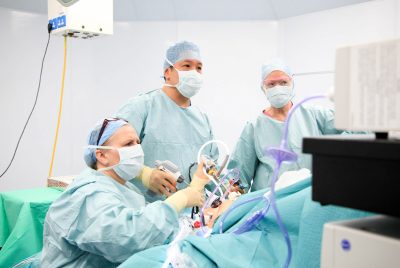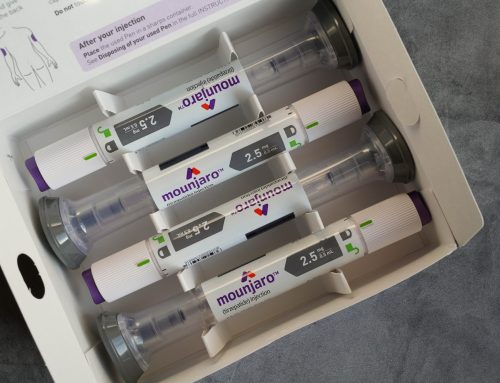What Is Gastric Sleeve Surgery?
It is a weight loss procedure that significantly reduces the size of your stomach. By removing a large portion of the stomach, it is transformed into a small sleeve, which limits food intake and reduces hunger. This article will explain how the bariatric surgery works, its benefits, and what to expect.
- The Sleeve gastrectomy involves the removal of approximately 80% of the stomach, thereby reducing food intake and associated hunger signals, which promotes significant and enduring weight loss.
- Eligibility for the surgery typically requires a BMI of 40 or greater, or 35 with obesity-related health issues, along with a documented history of prior weight loss attempts.
- Recovery from the sleeve gastrectomy necessitates adherence to strict dietary and lifestyle changes, regular follow-up appointments, and awareness of potential risks such as nutritional deficiencies and complications.
Understanding Gastric Sleeve Surgery
 Gastric sleeve surgery, a well-known form of bariatric surgery, involves the removal of a significant portion of the stomach, reshaping it into a narrow sleeve. This considerable alteration reduces the stomach’s capacity, thereby limiting food intake and decreasing the production of hunger hormones, namely Ghrelin. This weight loss surgery has grown in popularity due to its high success rates and is frequently chosen for its permanence and effectiveness.
Gastric sleeve surgery, a well-known form of bariatric surgery, involves the removal of a significant portion of the stomach, reshaping it into a narrow sleeve. This considerable alteration reduces the stomach’s capacity, thereby limiting food intake and decreasing the production of hunger hormones, namely Ghrelin. This weight loss surgery has grown in popularity due to its high success rates and is frequently chosen for its permanence and effectiveness.
The primary aim of the gastric sleeve is to enable significant and lasting weight loss for individuals suffering from obesity. The sleeve gastrectomy is now the most common metabolic and bariatric surgical procedure performed in the UK, accounting for more than half of all such operations. This preference is partly due to the minimally invasive techniques employed, which generally result in less pain and faster recovery times.
Individuals choosing the sleeve gastrectomy typically pursue a long-term solution for weight loss. The procedure significantly decreases food intake and modifies hunger signals, demonstrating itself as an effective means for achieving sustainable weight management and improvement in existing medical conditions.
How Gastric Sleeve Surgery Works
 Gastric sleeve surgery involves converting the stomach into a long, thin tube by removing about 80% of its tissue. This creates a banana-shaped stomach, drastically reducing its capacity and the amount of food one can consume.
Gastric sleeve surgery involves converting the stomach into a long, thin tube by removing about 80% of its tissue. This creates a banana-shaped stomach, drastically reducing its capacity and the amount of food one can consume.
Under general anesthesia, the surgeon uses the laparoscopic method, making several small incisions in the abdomen. Specialised instruments are then used to perform the surgery, ensuring minimal invasion and quicker recovery.
The sleeve gastrectomy surgery typically lasts between one to two hours, during which the surgeon staples and removes excess stomach tissue. The outcome is a vertical sleeve gastrectomy, which restricts food intake and induces hormonal changes that facilitate weight loss. This method effectively reduces stomach size while preserving the digestive system’s natural function.
Benefits of Gastric Sleeve Surgery
The benefits of the sleeve gastrectomy surgery include significant weight loss, with an average weight loss of 65% of their excess weight. Most of this weight loss occurs within the first two years, making it a popular choice for those seeking rapid results.
Health improvements after gastric sleeve surgery are profound. Conditions like:
- Type 2 diabetes, which often improves significantly or goes into remission
- Hypertension, which can see significant improvement
- Sleep apnoea, which may also improve or resolve
- Improved blood sugar regulation and decreased reliance on diabetes medications are frequent outcomes. Furthermore, the relief of sleep apnoea and a reduction in obesity-related medical conditions, including joint pain markedly enhance patients’ quality of life.
Beyond weight loss and immediate health benefits, patients often experience a decreased risk of heart disease and a reduction in high cholesterol levels. Many enter diabetes remission and can eliminate their need for medication. Overall, gastric sleeve surgery significantly improves general health outcomes.
Who Is Eligible for Gastric Sleeve Surgery?
 Eligibility for bariatric surgery is primarily determined by Body Mass Index (BMI) and related health conditions, such as high cholesterol, heart disease and high blood pressure. Candidates typically have a BMI of 40 or greater, or at least 35 with obesity-related conditions like diabetes or hypertension. In some cases, individuals with a BMI over 30 and significant health issues may also be considered.
Eligibility for bariatric surgery is primarily determined by Body Mass Index (BMI) and related health conditions, such as high cholesterol, heart disease and high blood pressure. Candidates typically have a BMI of 40 or greater, or at least 35 with obesity-related conditions like diabetes or hypertension. In some cases, individuals with a BMI over 30 and significant health issues may also be considered.
Candidates must have pursued weight loss through non-surgical methods, such as dietary improvements, increased physical activity, and other lifestyle changes to shed excess weight.
A multidisciplinary team conducts a comprehensive evaluation to ensure patients understand the surgery’s outcomes and are prepared for the necessary lifestyle changes required post-surgery.
Pre-Surgery Preparations
Preparing for the gastric sleeve involves several crucial steps. Candidates must demonstrate their attempts at weight loss through dietary and exercise improvements. In the weeks leading up to the surgery, commencing a physical activity programme and ceasing tobacco use are vital, reducing post-operative risk and enhancing immediate recovery. Additionally, patients must adhere to a liver shrinkage diet / liver reduction diet for one to four weeks prior to the operation to facilitate surgical access and reduce the risk of complications.
Significant dietary changes are essential both before and after surgery. It is also important to increase regular physical activity to at least 30 minutes each day. These measures contribute to immediate surgical success and lay the groundwork for long-term recovery and weight loss.
The Surgical Process
 The Gastric sleeve is typically performed laparoscopically, renowned for its minimally invasive nature and quicker recovery. Patients are placed under general anaesthesia to remain unconscious and pain-free.
The Gastric sleeve is typically performed laparoscopically, renowned for its minimally invasive nature and quicker recovery. Patients are placed under general anaesthesia to remain unconscious and pain-free.
During the surgery, approximately 80% of the stomach is removed, converting it into a slender, tube-like structure. This significant reduction restricts food intake and enables patients to feel full more quickly. The entire procedure typically lasts between one to two hours.
The laparoscopic approach, also known as keyhole surgery, is favored for its reduced recovery time and minimal scarring. This method results in less postoperative pain and a quicker return to daily activities compared to traditional open surgery.
Post-Surgery Recovery
 Recovery after the sleeve gastrectomy requires careful attention to diet and lifestyle adjustments. The hospital stay after the sleeve gastrectomy is usually 1 to 2 nights. Initially, they follow a liquid diet of nourishing fluids for two weeks, gradually progressing to a pureed diet, soft diet and finally to a diet comprising of solid foods over the course of several weeks.
Recovery after the sleeve gastrectomy requires careful attention to diet and lifestyle adjustments. The hospital stay after the sleeve gastrectomy is usually 1 to 2 nights. Initially, they follow a liquid diet of nourishing fluids for two weeks, gradually progressing to a pureed diet, soft diet and finally to a diet comprising of solid foods over the course of several weeks.
Post-surgery, individuals may experience side effects such as heartburn, nausea and regurgitation. It is essential to adjust to new eating habits; patients should consume their food slowly and mindfully, eating smaller portions to prevent discomfort and food intolerance. Guidance and support is essential, particularly in the immediate post-operative period.
Long-term recovery requires regular follow-up appointments to monitor health, food tolerance and dietary habits. These consultations ensure that patients are adapting well to their new lifestyle and meeting their weight loss goals.
Potential Risks and Complications
As with any major surgery, gastric sleeve surgery carries potential health risks. One primary concern is the development of blood clots, which can lead to serious complications such as deep vein thrombosis or pulmonary embolism. Additionally, stomach leaks can occur post-surgery, potentially resulting in internal infections requiring hospitalisation, antibiotics and nutritional support.
Wound infections are another possible complication. Gastrointestinal blockages may arise due to scarring or strictures, leading to significant food intolerance. Nutritional deficiencies are also a concern, as patients may struggle to absorb essential vitamins and minerals post-surgery.
Rapid weight loss following gastric sleeve surgery may lead to the development of gallstones, which can be painful and may require additional treatment. Patients should be aware of these risks and work closely with their healthcare team to mitigate potential complications or allow early detection.
Alternatives to Gastric Sleeve Surgery
While the sleeve gastrectomy is popular, there are several alternatives. Gastric bypass surgery involves creating a small stomach pouch and rerouting the intestines, limiting both food intake and nutrient absorption, leading to significant weight loss.
Another option is the gastric band, which involves placing an adjustable band around the upper part of the stomach to create a smaller pouch. The band can be adjusted to control food intake, offering greater flexibility compared to the permanent sleeve gastrectomy.
The gastric balloon procedure is a non-surgical alternative that involves placing a balloon in the stomach, with the aim to reduce food intake, to assist with weight loss.
Importance of Lifestyle Changes
 Undergoing the sleeve gastrectomy signifies the start of a lifelong commitment to healthier living. The procedure induces hormonal changes that assist in weight loss and may alleviate conditions related to obesity. Following a regular meal pattern with three meals a day helps maintain healthy habits and prevent overeating.
Undergoing the sleeve gastrectomy signifies the start of a lifelong commitment to healthier living. The procedure induces hormonal changes that assist in weight loss and may alleviate conditions related to obesity. Following a regular meal pattern with three meals a day helps maintain healthy habits and prevent overeating.
Post-surgery, regular exercise plans help maintain muscle mass and support weight loss. Long-term follow-up appointments monitor nutritional health and may include blood tests to check vitamin levels.
Consulting with a specialist bariatric practitioner helps patients set realistic dietary goals and overcome barriers to a healthy diet.
Mr. Alan Li’s Approach to Patient Care
Mr. Alan Li emphasises a patient-centered approach, tailoring treatment plans to meet the unique needs of each individual. With over 6,000 bariatric operations and more than 10,000 procedures to his name, Mr. Li’s expertise and commitment to patient care are unparalleled. Even after retiring from the NHS, he continues to deliver expert care for challenging bariatric cases across the North West.
Mr. Li’s holistic care philosophy includes comprehensive aftercare, which is vital for ensuring long-term success after surgery. His practice also offers non-surgical weight loss services along with a dedicated patient support team that helps individuals navigate lifestyle changes and provides psychological support.
Consultation Process with Mr. Alan Li
 Mr. Alan Li provides free consultations, either in person or remotely, offering flexibility for patients. During the consultation, he carefully evaluates the patient’s medical history and current health status, while discussing lifestyle and weight loss expectations.
Mr. Alan Li provides free consultations, either in person or remotely, offering flexibility for patients. During the consultation, he carefully evaluates the patient’s medical history and current health status, while discussing lifestyle and weight loss expectations.
After the consultation, patients are advised on the next steps, which may include scheduling surgery and additional evaluations by specialists. This comprehensive approach ensures personalised care tailored to each patient’s specific needs.
The gastric sleeve offers a transformative solution for individuals struggling with obesity, providing significant weight loss and numerous health benefits. The procedure itself is meticulously designed to reduce stomach capacity and alter hunger signals, leading to substantial and lasting weight loss. However, it is essential to understand the eligibility criteria, pre-surgery preparations, and potential risks involved.
For those considering this transformative surgery, consulting a specialist like Mr. Alan Li can offer invaluable insights and personalised care. With a patient-centred approach and broad expertise, Mr. Li ensures that each individual is thoroughly prepared for their weight loss journey and supported at every step along the way.






Leave A Comment